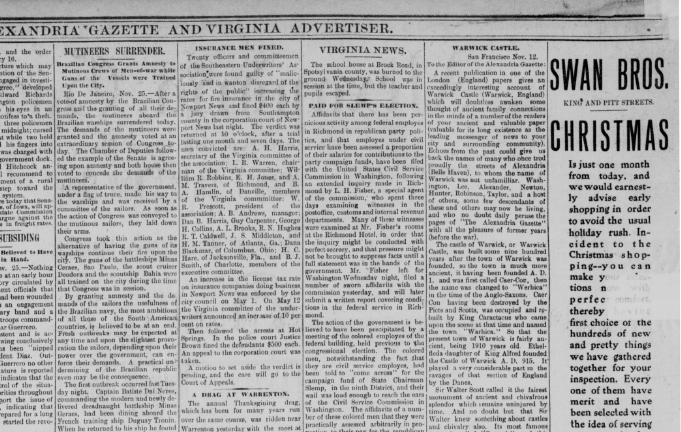|
Moderated by NW Okie! |
Volume 14 , Issue 372012Weekly eZine: (374 subscribers)Subscribe | Unsubscribe Using Desktop... |
Warwick Castle of Warwick, England

In searching through historic newspapers for mention of our Warwick surname we found an interesting feature concerning the "Warwick Castle" of England, printed in the Alexandria Gazette, dated 25th of November 1910, via San Francisco, Nov. 12th (1912). Other than the Warwick name, I have found no ancestral connection to the Warwick Castle.
The following piece was written to the Editor of the Alexandria Gazette from a San Francisco news paper.
"A recent publication in one of the London (England) papers gives an exceedingly interesting account of Warwick Castle (Warwick, England) which will doubtless awaken some thought of ancient family connections in the minds of a number of the readers of your ancient and valuable paper (valuable for its long existence as the leading messenger of news to your city and surrounding community).
"Echoes from the past could give us back the names of many who once trod proudly the streets of Alexandria (Belle Haven), to whom the name of Warwick was not unfamiliar. Washington, Lee, Alexander, Newton, Hunter, Robinson, Taylor and a host of others, some few descendants of these and others may now be living, and who no doubt daily peruse the pages of The Alexandria Gazette with a lll the pleasure of former years (before the war).
"The Castle of Warwick, or Warwick Castle, was built some nine hundred years after the town of Warwick was founded, so the town is much more ancient, it having been founded A.D. 1. and was first called Caer-Con, then the name was changed to Werhica in the time of the Anglo-Saxons. Caer Con having been destroyed by the Picts and Scotts, was occupied and rebuilt by King Caractacus who came upon the scene at that time and named the town Warhica. So that the present town of Warwick is fairly ancient, being 1910 years old (in the year 1910). Ethelfleda daughter of King Alfred founded the Castle of Warwick A.D. 915. It played a very considerable part in the ravages of that section of England by the Danes.
"Sir Walter Scott called it the fairest monument of ancient and chivalrous splendor which remains uninjured by time. And no doubt but that Sir Walter knew something about castles and chivalry also. Its most famous tower is called "Caesar's" and this magnificent structure has stood in dignity and majesty unchanged by time for nearly on thousand years, and undamaged by war for all this time, being as firm now as the rock on which it is founded. No visitors are admitted to this tower, below which, deep down, is the terrible dungeon in which the unfortunate prisoners rotted out their lives.
"From the lodge to the castle the approach is cut through solid rock for one hundred yards. The scene which bursts upon the visitor after passing through the big double gateway -- the sight of the magnificent irregular castellated pile of the feudal barons of Warwick is not easily forgettable. Inside the castle everything is just as interesting as on the outside. A priceless collection of pictures, armor, and objects of vert are housed here. The most interesting room is the great hall, which contains the gigantic armor and weapons of the great and formidable Earl Guy, of Warwick.
"This 'Caractacus' who rebuilt the town of Warwick opposed the Romans and was the first king of Brittany. He surrendered to Claudius Caesar. His descendants held many prominent positions in England, and the name Caractacus finally changed to Casadock and Craddock, then Newton. John Caradock was Lord of Newton. The name Caractacus died out altogether, and only "newton" remained. It is interesting to know that the record of the descent from Caractacus the first king of Brittany to the Newton family of Virginia and its branches is about as perfect as can be. I guess all of our ancestors were once privates, and savages. Are we any better off today (1910)?"
| View or Add Comments (0 Comments)
| Receive
updates ( subscribers) |
Unsubscribe
| © . Linda Mcgill Wagner - began © 1999 Contact Me | |
